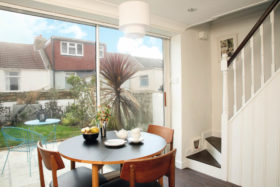

The Weirs were living in Caversham, on the outskirts of Reading, when they make the bold decision to move to Cornwall. Ross – who had grown up in a small village in Somerset, so was no stranger to life in the West Country – was getting tired of his daily commute into London and the long working hours that came with this role in an American software company.
With their children not yet in secondary school, it seemed like the perfect moment for a change. “We wanted to spend more time together as a family and we’d always longed to live by the coast,” says Rebecca. “Devon and Cornwall were top of our list.”
They scoured the internet in the search for their dream new dwelling, however, they weren’t just looking for somewhere to live, as they ideally needed something that could also provide an income.
“We had considered running a coffee shop, but having always been practical and capable DIYers, it seemed like a no-brainer to capitalise on the West Country’s established tourism industry,” says Ross. So, with their eyes set on building a new business, they embarked on their search for a holiday destination opportunity.
A 19-acre farm lent itself as the perfect potential project. It was home to an array of traditional stone-built houses and a large Dutch barn, which came with planning permission to convert into a holiday letting.
“Some of the places we’d seen were dated and in poor shape, but the whole farm was in a decent condition, plus it had previously made revenue from lettings,” says Ross. Within an hour of viewing it they decided to buy. They soon moved into the main house, let out the other cottages and looked into the conversion.
The planning permission for the barn conversion had several stipulations. Firstly, the steel wind-bracing along the side of the structure had to be retained and, secondly, the replacement shell needed to look as if it was built within the original frame. However, this wasn’t as simple as it first seemed.
“When we started work we discovered that the entire building was waterlogged, so we asked the architects if we could do away with the wind-bracing altogether, since so much of it was rotten,” says Ross. “They advised us to go ahead, but to utilise as much of the original material as possible.”
In the end, the only elements that were good enough condition to use were two uprights and one brace, so most of the steel detail on the finished building is new.
However, trouble struck when building control came over to check the structure. They queried whether the project was a conversion or, in fact, a new build. “They reported the matter to our local authority, who contacted us to let us know that we were in breach of our conditions,” says Ross.
The Weirs were presented with two choices: either make a fresh application for a new build (which they looked unlikely to gain approval for, since they are located within an area of outstanding natural beauty); or apply for a Lawful Development Certificate.
The latter would aim to prove that the building work was legitimate without the need for planning permission – and seemed the most suitable option. “Our structural engineer produced a letter explaining that the discarded ironwork was unsafe. Our architect also wrote to point out that we had approached the planners early on to explain what we were doing and that they had said it was okay at that point,” says Ross.
“The uncertainty over the barn at this stage was quite stressful, since we’d already spent quite a lot,” says Rebecca. But, having invested so much money, time and emotional energy into the scheme, the couple decided to carry on in the meantime and hope for the best. Thankfully, luck was on their side.
“Eventually, after a couple of months the council agreed, although somewhat begrudgingly. They said that it wasn’t something they felt they would be successful in taking us to court over,” adds Ross.
Construction proceeded with the help of new friend David Gregory, who shared the role of project manager with Ross. “He sourced the subcontractors and helped us to locate the zinc roofing and glulam suppliers,” he says. “He was very good at communicating with us throughout as the project progressed and never set about something without consulting us first.”
Ross and Rebecca began using the cottages as holiday lets as soon as they moved to Cornwall, but they were concerned about how the construction work could affect business. “We were conscious that we needed to provide guests with a good experience because we really didn’t want bad reviews,” says Rebecca.
This could have proved difficult and stressful, but fortunately lots of the messy tasks (such as the groundworks) were completed between January and March, ahead of the busy holiday period. “We made sure the builders kept a tidy site, plus they delayed starting anything noisy until after 10am,” she says.
The finished building is a contemporary revision of the barn, with pale red cedar cladding and a zinc roof, plus detailing that pays homage to its previous appearance. The steel wind-bracing makes an attractive contrast to the pale facade, plus the nailheads have been left exposed just as they were on the original structure, which is also a nod to its agricultural history.
Although mains electricity was already in place, the Weirs were keen to utilise some environmentally friendly resources. “We needed central heating for the barn, and the existing system in the cottages was 20 years old and failing. Biomass technology is eligible for cash payments under the government’s Renewable Heat Incentive scheme, plus it’s renewable and better than having a propane tank. Our boiler provides warmth to the barn and the cottages on the farm,” says Ross.
Inside, the rounded roof creates a sense of volume and the glulam beams (which were custom made in a Devon factory) bring design interest to the ceiling. “I could sit in the living area forever just gazing up at them,” says Rebecca. “It’s easy to forget how big this space is because it’s so different to conventional rooms.”
Choosing to move, build and place their children in a new school all at the same time proved to be stressful for the Weirs, but what they’ve accomplished on the farm has been worth all the ups and downs.
“We’ve achieved so much, considering we only moved here a year and a half ago,” says Ross. “I like the modern look of the barn, with its roomy and luxurious feel – we sometimes live in there ourselves when there are no guests,” adds Rebecca.
Although they have no regrets about their renovation adventure, they are undecided when it comes to the thought of doing it again. “One of us would, the other wouldn’t!” says Ross. “I think I’ve got the urge to build out of my system for now, although I wouldn’t mind another conversion project at some point.”
